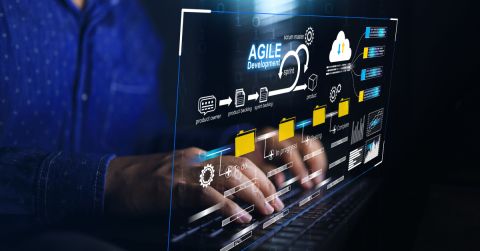Exploring the Future: AI, Sustainability, & Compliance ft. Tom Raftery

In this episode of the CTRL+LISTEN Podcast, James and Nora engage in a riveting conversation with podcast legend Tom Raftery. Tom, with his vast experience since 2005, explores the realms of AI, sustainability, and compliance in the tech industry.
Starting with the buzz-worthy topic of AI, the trio delves into the challenges and concerns surrounding its integration into various sectors, uncovering issues like racial biases in healthcare AI. Tom shares his firsthand experience with ChatGPT and its capabilities, shedding light on the potential impact on professions like design and data analytics.
The conversation seamlessly transitions to sustainability and compliance in the tech industry. Tom breaks down the intricate web of regulations, from deforestation rules to forced labor regulations, emphasizing the shifting landscape of compliance requirements. The trio explores the impact of sustainability on recruitment, customer acquisition, and board decisions.
The discussion widens to the environmental aspects, with a focus on the Fit for 55 legislation and global sustainability goals. Tom underscores the urgency of reducing emissions and the transformative changes required in the next six years. The implications on business decisions, considering both financial and climate aspects, are thoroughly examined.
As the podcast wraps up, the trio contemplates the transparency mandated by sustainability regulations and its potential influence on companies' systems. The conversation ends with a pondering of the effects of these regulations on inflation and prices.
Listen to the Episode
Watch this Episode
Episode Highlights
- Intro
- The Cons to the Pros of AI Integration
- Who Owns Generative AI Creations?
- AI, Automation, & Smart Systems
- How Reliable is AI Supply Chain Data?
- Sustainability & Compliance Trends
- Regulation, Inflation, and Prices
- Outro
Links and Resources
- Subscribe to Octopart Channel on Youtube and Watch the Previous Ctrl + Listen Episodes
- Connect with Tom Raftery on LinkedIn
- Tune in to Tom Raftery's Podcast: Climate Confident
Transcript:
James Sweetlove:
hey everyone thank you for tuning in this is James from octopart you are listening to the control listen podcast I'm here with my co-host Nora and our guest today is Tom raftery uh he is a podcast Legend in this space he's been doing it since 2005 long time had some amazing guests across his shows uh the shows you may have heard of today are digital supply chain and climate confident we're going to be discussing some topics from both uh nor I know you had some questions you wanted to ask so I'll let you uh take the lead from
Nora Berman:
here yeah I I thought we could begin the discussion talking about AI since it's all everyone wants to talk about right now and um you know what are what are the challenges and what are the concerns that come with the integration of AI in robotics in various sectors like manufacturing healthare Transportation like I'm I'm interested in kind of starting the conversation with the what are the things we should be wary of and then maybe we can move into the benefits the the the cons to the pros.
Tom Raftery:
yeah it's yeah you're right AI is the topic toour it's every it's what everyone is talking about and you know it's since obviously chbt with was released into the wild last year November 30th it it went live and uh I was checking recently my one password Vault uh and I I checked my chat GPT account and I set it up around noon on the 1st of December so chat GPT had gone public probably 12 hours when I set up my account on it uh I I like to be kind of an early mover in these things and sure enough it's it's been it's really taken the World by storm um the kind of concerns there are lots of them obviously uh I I saw just recently there was an article talking about how in health care uh they ran a study across multiple AIS and they found asking them questions medical questions they found that there were racial biases built into a lot of the AIS which obviously is is quite concerning because you know they were asking them standard medical questions and they were coming back with racially differentiated answers so you know things like that are a concern it's the old garbage in garbage out if it's
trained on biased data it's going to give a biased result so we're still at the very early stages of this it's it's massively changing technology but we're at early days and a lot of these issues that we're having you know will be worked out in time um I use chat GPT all the time uh I just as an experiment yesterday for example I asked it to first of all I I I told it I gave it a description of my digital supply chain podcast told it what it is you know told it what kind of uh show it is what the mission statement is all that kind of thing and I said to it what would be a good prompt for Del to create podcast art for this podcast by the way here's Apple's guidelines for creating podcast cover art based on that what would be a good prompt for Del and sure enough it came back with a beautiful prompt so then I didn't go I didn't bother going to Del because I have chat gbt with the Del plug-in enabled so I just opened up a new chat threw in the prompt that it had given me and said could you create some um podcast cover art for me using this prompt sure enough out it came and I got you know I went I iterated
it several times and I came up with six that are really liked and then I went over to Instagram and on Instagram I asked people what do you think of these six and one guy who's a designer came back to me and said Tom these are really impressive and I'm a designer he said the issue I have is what do I do now you know because this is something it would have you know it would have taken I would have had to have gone to a designer and I would have had to have paid them I don't know how much to come up with six concepts for podcast cover art I know you can do it in canva which you need an account on canva you know even canva is using AI to take away jobs from designers so it's you ask what are concerns obviously the the medical one is one but obviously as well for you know people like designers these kind of things have to be well ly concerning as well and then you have the whole data analytics because again chat GPT and I I talk about that one because it's the one I use most but there are lots of others out there as well but chat GPT has a data data analytics plugin and for example just as a test I downloaded
my podcast stats and then I uploaded them to the data analytics plugin of chat GPT and I gave it a wide open question I said here's the podcast download stats from my podcast what are some interesting takeaways from this and it parsed the CSV file and it came back with a load of insights and it then said look we could do this kind of analysis on it or this kind of analysis on it or this kind of analysis or this do you want me to proceed and do those I just said yes and then it started doing those and I started giving uh Excel spreadsheet links to Excel data to Excel spreadsheets that had created based on the data it started throwing up graphs charting the data all this kind of stuff so again now I don't think a lot of professional data scientists are going to be put out of work by this but it means that you know companies that might have been thinking about taking on a data scientist might now think twice and go yeah maybe we'll put it off for a while because we can just use the plugin and chat GPT and as we get further down the line maybe we'll put off getting a data scientist for another 2 3 4 months
James Sweetlove:
one thing uh I just wanted to to raise with you as well because this is something people talk about a lot of in the spaces I operate in outside of this uh with the creative generative AI is who owns that that's the question that everyone asks so yeah you can create this cover up but who actually owns that do you own that does does the company that generates it own that what about the artist that P prompts from that that's the gray space
Tom Raftery:
really yeah I mean Microsoft have a good one as well in being image create and as far as I know with their being image create the image is then yours so I think in their case at least it it's pretty clear who owns it it's you generated The Prompt so the art is yours um I'm not as sure about di 3 I just haven't looked into it to be honest
James Sweetlove:
right uh crazy
Nora Berman:
what about for things like Automation and Smart Systems I have do you have any experience with AI and um its relation to those
Tom Raftery:
well yeah I mean we all have to an extent because you know if you drive a car the more modern cars are getting the Adas you know Advanced Driver assistance systems built into them so they can start you know telling you when you're veering a little to the left or to the right getting too close to the L the lanes I have a system in my car which you know I can tell it's it's cruise control but Advanced cruise control so I can it can take over it can start steering accelerating decelerating all that kind of thing it you know when I stop at traffic lights uh I don't have to think about when the next car ahead of me pulls off it does automatically and it pulls off itself and you know this isn't a Tesla this is just you know it is an EV but it's it's not wildly Advanced one I mean the Teslas with their apparently full self driving um you know they are more advanced on that front and that is all AI That's taking inputs from sensors uh sometimes radar sometimes cameras sometimes a mix on the vehicles and you know watching the road and I my car
is a Nero a Kia Nero and it's fantastic I got to say I love putting that on when I'm on a long drive on the motorway and just let it take over obviously I don't you know go to sleep or anything like that but it means I can relax a bit I don't have to my I don't have to my foot on the accelerator the whole time I just keep a watchful eye every so often grab the steering wheel to make sure we're uh it knows I'm still awake but other than that it makes longer trips very very easy um you you also see a lot of Automation in Industry we see a lot of data in Industry as well I mean the the whole advance of iot means that we are now getting tons more data than we ever had before and of course you need AI to parse that data because there's no way a human could so you know the AI comes in parses the data and then goes okay we need to look over here because there's a blip here which you know a normal person might not have seen in a whole sea of data but of course that's precisely what AIS are particularly good at
Nora Berman:
yeah that leads me to my next question which is how reliable is that data especially in regards to supply chain
Tom Raftery:
yeah so the generative AIS that we're seeing the likes of the chpt the llms they're not reliable in that kind of a scenario because they can have this hallucinatory thing but there are lots of other types of AI uh which don't have that and that isn't an issue and those are the kind of ones you'd be using in those scenarios so you know you've got uh vision-based AIS for example which are great for doing safety assessments um you know you see trains now with cameras in their undercarriage and they're examining the tracks and they're examining foliage all around them they're examining the wheels to make sure the wheels are fine and all this is done with standard cameras which can examine things at very high speed much faster than a human eye could and find any issues find any safety issues and alert similarly in you know factories where they're manufacturing let's say cars or large sheets of metal for or anything any kind of casting stuff again traditionally you had people you know looking at the output from one of these casting machines and looking for any cracks any faults any defects things like that but now cameras can do it much more quickly much more effectively than people can and so we're starting to see in a lot of factories vision-based AIS take on that role and the output be far faster and far more reliable
Nora Berman:
wow
James Sweetlove:
we also want to talk to you about uh the environmental side of things because you have that whole podcast dedicated to that space um and obviously it's becoming increasingly important these days with new regulations with public opinion that we have to have a focus on this um area so I'd love to ask what trends do you see in sustainability and compliance in Tech
Tom Raftery:
yeah that's a that's a big question there's a lot going on and it's amazing because you know up until 2020 there wasn't a lot of compliance issues really around this kind of area there wasn't a huge amount of Regulation there was but it wasn't we've seen a huge amount of changes in the last three and a half years uh the likes if which we hadn't seen in 10 20 years previously and the kind of things I'm talking about are there's a new uh EU DeForest regulation for example uh which is coming into effect at the start of next year and what it means is if you are a company importing Goods into the EU then you have to be able to show that the goods you're importing into the EU were not responsible for deforestation where they were sourced since December 20120 so you have to be able to go back in time and show that now this is across seven categories of goods it's not all Goods being imported but it's things like uh coffee it's things like meat it's things like palm oil all these kind of things rubber is another one I can't remember the full of seven but those kind of categories are going to expand as well wood is another obvious one uh another category but those those are going to expand so companies now bringing stuff into the EU and it's not just European companies it's any company bringing stuff into the EU has to be able to show that they're not causing deforestation and have to be able to show that no deforestation was caused by the production of these Goods since
wherever they were sourced since December 2020 so that's that's a big Challenge and obviously VI ly that's not something you can do with the pen and paper that's something you obviously need satellite data to be able to show I can't think of another way you could effectively prove it apart from satellite data so that's that's a big one there uh you've got a lot of other regulations coming in as well on the you know the site of ESG uh so the S is social so things like forced labor regulations they're coming in uh Germany passed forced reg forced labor regulation at the start of this year uh so it's effective already uh for large companies and from the start of next year for all companies and again they and and the onus is on the companies to show that there is no Force labor in their supply chain and already the three large Automotive companies BMW Volkswagen and Mercedes have been I don't know if they've been taken to court but they are being investigated under that law because of apparent forced labor in their supply chains in China so you know this is and these these regulations have teeth these they're like they're similar to gdpr the onus is on the manufacturing companies and they are liable for up to four five 6% of their Global sales if they're not in compliance with this regulation uh so you know so that's that compliance then uh you have climate reporting regulation coming in as well uh it's coming in in Europe it's already been passed in California the SEC are discussing it for all of the us it's
going to come in other regions as well so uh this will require companies to report their emissions out to scope three typically and if not now then soon those reports will require will be required to be auditable as well so again you see very often in companies today that the people responsible for sustainability the chief sustainability officers very often they report into the marketing organization they report into the CMO and that kind of tells its own story of what these companies feel sustainability as far whereas with this shift in regulations and with the increasing rigor that's going to be required around reporting emissions that function will have to shift to likely the CFOs organization uh because of the rigor dep demanded so that that's a big shift and again there's no way you can report these kind of things without having a totally digitized supply chain and visibility into your suppliers Supply chains as well because scope 3 goes out that far you've got to be able to show that what you're getting from your suppliers well not you have to be able to show the impact of purchasing from suppliers on your emissions so if you buying uh parts for cars that you're manufacturing if those parts are made in Poland for example they'll likely have a high carbon footprint because the Grid in Poland is very coal heavy if you purchase the same parts from a manufacturer in France the emissions would like to be far lower because there's a lot of new nuclear power in the French grid so the amount of uh
emissions required to generate electricity in France are significantly lower so you know those kind of things are going to start to be taken into account there's there's a lot of other pressures happening as well it's not just compliance-based but also you know boards are starting to take interest in this Banks and insurance companies are starting to take interest in this so if you have a significant amount of emissions uh in your profile then Banks might start to look at scance at you insurance companies might start to question it uh if you are for example going to build a new power plant if that power plant is going to be powered by fossil fuels well then you'll have a hard time getting financing for it because if it's going to be powered by coal you just won't get any money for it from anyone because coal is going so much out of fashion that plant will be shut down in five years maximum and so there's no way you'll get a return in that investment in five years so that's just forget it if it's a gas powered plant again it's going to be harder to get financing for it you will get some but it'll be at a far higher cost so the amount of the the cost of capitalization of fossil fuel projects is typically in excess of 20% 20 to 25% whereas the cost of capitalization of renewable projects is typically sub 5% so there a huge gap there and that Delta is increasing and so just because of that we're starting to see it's far easier far faster and far cheaper to roll out
renewably powered projects rather than fossil fuel ones which is obviously a good thing and it's not just the finance industry also employees are taking notice of what their companies are doing so you're starting to see a lot of employees activist employees pressuring their own companies to do the right thing to lower their emissions to report on their emissions and what you see is companies that have a good sustainability story to tell they find it easier to Source new employees and their rates of turnover of employees are lower so it's there it's the cost of recruitment for companies are typically very high but if you have a very good sustainability story your costs of recruitment are lower and your retention rates are higher so you don't have to recruit as much either so you know those are significant costs to companies Recruitment and Retention and if you can reduce those that's great and then on the flip side of it you have customers customer acquisition costs are reduced again if you have a good sustainability story that you can tell you know the likes of Patagonia and Timberland and people like that you know they Oakley I I drink Oakley oat milk for example with my coffee onam there you go that's that's that's coffee made with with oakle milk um you know they tell a good sustainability story they have the carpon footprint of the liter of Oakley on the side of the carton it's turns out it's about 44 or 45 I can't remember exactly it's either
44 or 45 grams per liter is that good I have no idea because nobody else is doing it you know I could get a liter of cow milk or uh almond milk put them side by side with the Oakley milk and they don't tell you how much it costs or how much the emissions are so until everyone is doing that then it's it's hard to tell but on the other hand because they're doing it they've got a good name for being that transparent and more people are likely to buy their product so the cost of customer acquisition for companies that tell a good sustainability story is lower as well so it's easier and cheaper to get customers it's easier and cheaper to get good employees because you have serious competition for any jobs you advertise uh your boards are going to love it your finance and insurance companies are going to love it so it's it's a winwin winwin across the board compliance is more regulations coming in this space as well so you know it's uh it's it's similar to AI in that it's kind of like the topic toour everyone is talking about it but it's not one that's going to go away why do I say that because Europe has passed this fit for 55 legislation which says we have to reduce our emissions 55% by 2030 and you know out of context what does that mean very hard to tell but if I tell you that in 2020 when with the lockdown our emissions dropped 7% then they went back up 5 % in 21 when things started opening up again so we had a net reduction between 2020 and 2021 of 2% now this 55%
is against our 1990 Baseline and we've already reduced in the last few decades we've actually got our emissions down so we're actually down about 24% of that 55 already but that means we still have another 31% to get out of the system between now and 2030 which is just over six years away so the scale of the changes that we're going to have to see in our systems in the next six years are mindblowing they really are and I don't think a lot of people have grasped this and these are not targets these are mandated reductions on every country so this is legally binding on every country these these emissions reductions and it's not just Europe and the Biden Administration have said they want to get their emissions down 52% by 2030 China has said they want their emiss to Peak by 2030 now Bloomberg put put out an article recently saying that the Chinese emissions will actually likely Peak next year because China has this habit of coming out with these wildly ambitious goals and then blowing through them years ahead of time uh when China said that it wanted to H I forget the exact numbers but it produces these fiveyear plans and in 2015 its 5-year plan for 2020 said it wanted to reach a certain amount of so I can't remember exactly how many gigawatts of solar by 2020 and everyone can yeah that'll never happen they reached it in 2018 two years early and then they said okay here's what we want to do now by 2020 so another wildly ambitious solar goal for 2020 they blew through
that in 2019 you know so China has this record H it didn't just start in 2015 they've been doing it for for a couple of decades now and again they they have these wildly ambitious goals for 2030 and 2050 and 2060 and probably get through those ahead of time as well so the point I'm getting it China One of the major economic blocks in the world the EU another one the us another one all have very ambitious sustainability goals for 2030 and 2045 and 2050 and 2035 depending on which uh targets you're looking at and so and and and that 55% that Europe is trying to get out by 2030 that's the lwh hanging fruit so the other 45% that's left is going to be much harder to get out so so we so we have to work really hard to get the 55% up by 2030 and then the following 20 years we'll have to work even harder again to get the other 45% out in 20 years so this is not something that's going away anytime soon the opposite it's going to become more and more important with every year that goes by and so we're going to start to see that every single business decision will be weighed not just on its financial implications but also on its climate implications
James Sweetlove:
I think uh the great point amazing Point raised um I think that
Nora Berman:
so much
Tom Raftery:
nor his head just exploded
James Sweetlove:
as techn as this becomes more and more important I think technology is being focused more and more on the issue um so it's a difficult challenge but I think we're getting better tools uh to to deal with these issues as we progress down this path
Tom Raftery:
definitely definitely so it
Nora Berman:
also seems like
Tom Raftery:
you want to say something
Nora Berman:
yeah like because there's such an incentive and um it's mandatory to be transparent about your sustainability it seems like companies have to have systems in place to present and prove what they're doing
Tom Raftery:
yep
Nora Berman:
so yeah I mean my other question is how do those regulations affect um inflation and prices
Tom Raftery:
yeah so it's it's a good question and the short answer is I have no idea but um I think first of all it's a Level Playing Field for everybody and sure it requires a bit of extra work on the company side but it because it's a Level Playing Field because everyone is dealing with the same regulations you start to get economies of scale happening as well and so I mean this the same question could be asked about you know the financial regulations that are there for financial reporting they do put a burden on companies uh because they all have to report and they have all these regulations about how they have to report and they all have to be audited and they have to present audited reports and etc etc etc but it hasn't caused massive inflation and it hasn't put a lot
of companies out of business the opposite a lot of lot of auditing companies and the big four have made a lot of money off it you know so it it's just it moves the money around you know again the uding firms are going to love this uh a lot of companies with higher missions are not going to love it so much companies with lower emissions are going to like it because they'll be shown to be cleaner and you know they'll have a better story to tell their customers and so they'll attract more customers so yeah it's it it's one of these things it's it's it's you know moving chess pieces on a board the money is the money is always there just it's depending on where it goes
Nora Berman:
um
James Sweetlove:
right there are a couple other topics we really wanted to talk about but unfortunately we've already gone over time uh totally fine amazing discussion I think we're just gonna have to have you back on sometime that's that's the solution
Tom Raftery:
Thanks James
James Sweetlove:
any time but yeah seriously thank you for coming on the show and taking the time to speak with us it's been uh really really educational
Tom Raftery:
no not at all thank you sorry for rattling on so long you got me uh you got me talking about something I'm passionate about so I just wouldn't
James Sweetlove:
well
Nora Berman:
it's it's crucial information yeah
James Sweetlove:
i' like to see it
Tom Raftery:
good glad glad you think so
James Sweetlove:
yeah well for everyone else who's who's been listening thank you so much for tuning in and uh yeah we're gonna have to have Tom back but tune in next time we have another guest for you










